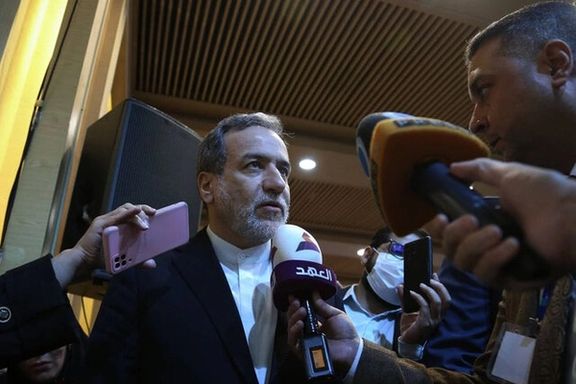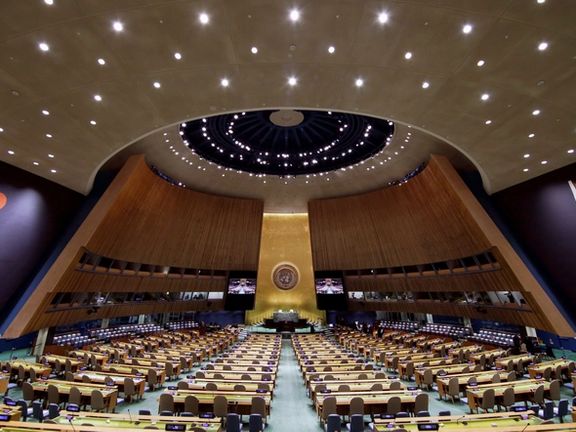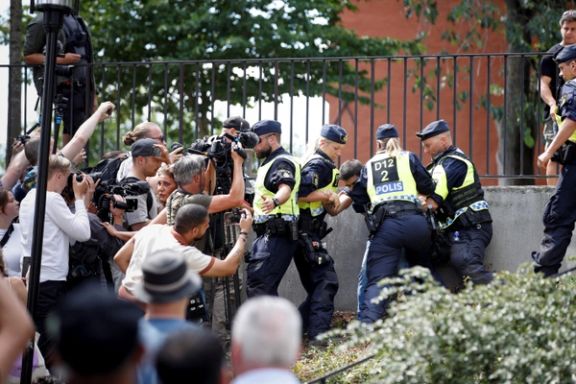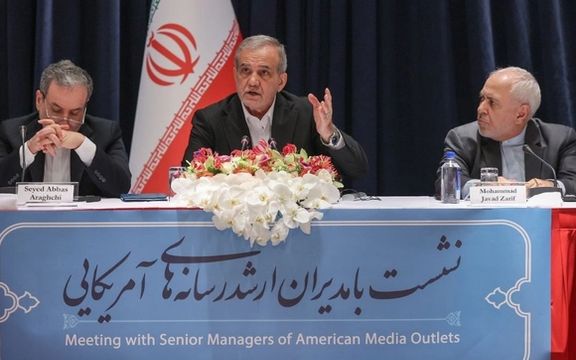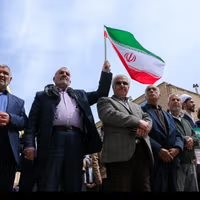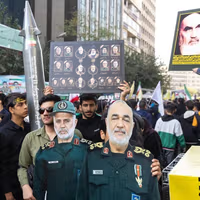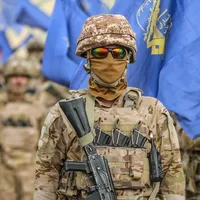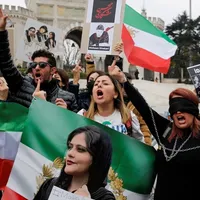Pezeshkian’s supporters hope his Tuesday UNGA speech and meetings in New York may help present a better, more peaceful image of Iran to the world and pave the way for lifting US sanctions.
Others believe he has no authority to do anything other than reiterating Supreme Leader Ali Khamenei’s anti-American, anti-Western, anti-Israeli stances and will stay away from meeting US and other Western officials like some of his predecessors.
Between 1979 and 1998 Iranian presidents rarely addressed the UN General Assembly in person. The exceptions were Mohammad-Ali Rajai who visited New York once during his four months of presidency in 1981, a year after Iraq invaded Iran, and then-President Ali Khamenei in 1987.
Mohammad-Ali Rajai 1981
Iran's second president, who had flown to New York immediately after symbolically visiting the war front spoke against both the United States and Russia for supporting Iraq in the war.
Rajai raised many eyebrows by removing one of his socks and putting his foot on the podium to show the scars of torture in prison before the Revolution.
Ali Khamenei (1981-1989)
Khamenei called on world leaders to hold an international tribunal like the Nuremberg tribunal to try Saddam Hussein and accusing the UN Security Council of supporting his invasion of Iran in September 1980 that led to a destructive eight-year war.
Akbar Hashemi-Rafsanjani (1989-1997)
Iran's fourth president never attended UNGA on whose behalf then Foreign Minister Ali-Akbar Velayati addressed the meetings. No reasons were ever offered for his absence at these international meetings. He was accused of being involved in two terror bombings of Jewish targets in Argentina in 1992 and 1994 and this could have played a role in his absence
Mohammad Khatami (1997-2005)
The Islamic Republic’s fifth president, the reformist Mohammad Khatami, was the first Iranian president after Khamenei to address the UNGA in 1998. Khatami argued in his well-received speech against Samuel Huntington’s theory of a Clash of Civilizations and proposed Dialogue Among Civilizations as the best alternative.
He also proposed that the year 2001 be proclaimed the Year of Dialogue Among Civilizations by the United Nations. The UN adopted his proposal in November 1998.
The 9/11 attacks and the US invasion of Afghanistan to remove the Taliban happened during the Year of Dialogue Among Civilizations after which Khatami delivered only one more speech at UNGA to defend his theory.
Khatami did not attend the speech by the US President, Bill Clinton in 1988. Clinton, however, attended Khatami’s speech. This was the only time a US president sat for the UNGA speech of any Iranian president.
Clinton was reportedly keen on a meeting that the Iranian delegation turned down, reportedly because Supreme Leader Ali Khamenei refused to give Khatami the green light.
Mahmoud Ahmadinejad (2005-2013)
The populist Mahmoud Ahmadinejad has a record of visiting New York eight times during his presidency to address the UNGA.
After his first UN speech in 2005, Ahmadinejad reportedly told a prominent Shia cleric that he felt surrounded by a halo-like aura of light while addressing world leaders. This claim drew widespread criticism from across the political spectrum.
He always attacked the US and other Western powers, Israel and NATO in his speeches. In 2010, he proposed to name 2011 the Year of Nuclear Disarmament and Nuclear Energy, as Iran's own nuclear program was under the UN Security Council's spotlight and sanctions were being imposed on Tehran.
The delegations of the US and other EU countries as well as Canada, Australia, New Zealand, and Costa Rica walked out in protest to his controversial stances before his speech in 2011. He accused the US government of being behind the 9/11 attacks in the speech.
Hassan Rouhani -(2013-2021)
During his eight years of presidency, Rouhani attended the annual UNGA twice, in 2013 and 2015.
Rouhani came under massive criticism from hardliners at home for accepting a brief phone call with then-President Barak Obama during his first visit to New York.
Around 100 hardliners protested against Rouhani at the airport upon his return to Tehran and threw shoes at his vehicle as a sign of disrespect.
During the same visit, Foreign Minister Mohammad-Javad Zarif and Obama had a brief, unplanned conversation in the UN hallways.
Ebrahim Raisi (2021-May 2024)
Raisi visited New York twice, in 2022 and 2023, to attend the annual UN General Assembly (UNGA) meetings.
Raisi displayed a photo of Qasem Soleimani, the slain commander of the Revolutionary Guards (IRGC) Qods Force during his speech, which took place immediately after the death of the 22-year-old Mahsa (Jina) Amini in the custody of the morality police and the beginnings of the Woman, Life, Freedom protests.
Raisi had no high-profile meetings during his two UN visits. Members of most Western delegations were absent from his speeches.
Raisi’s second visit in which his wife and his daughter accompanied him was marred at home by a video clip showing a van being filled with boxes of baby food and kitchen paraphernalia in New York.
A member of his team claimed these were gifts the Iranian team had received from other participating officials and packed in those boxes.
The government also said Raisi’s wife had accompanied him to meet with the wives of other foreign officials and interviews with ABC, NPR, and Newsweek.
